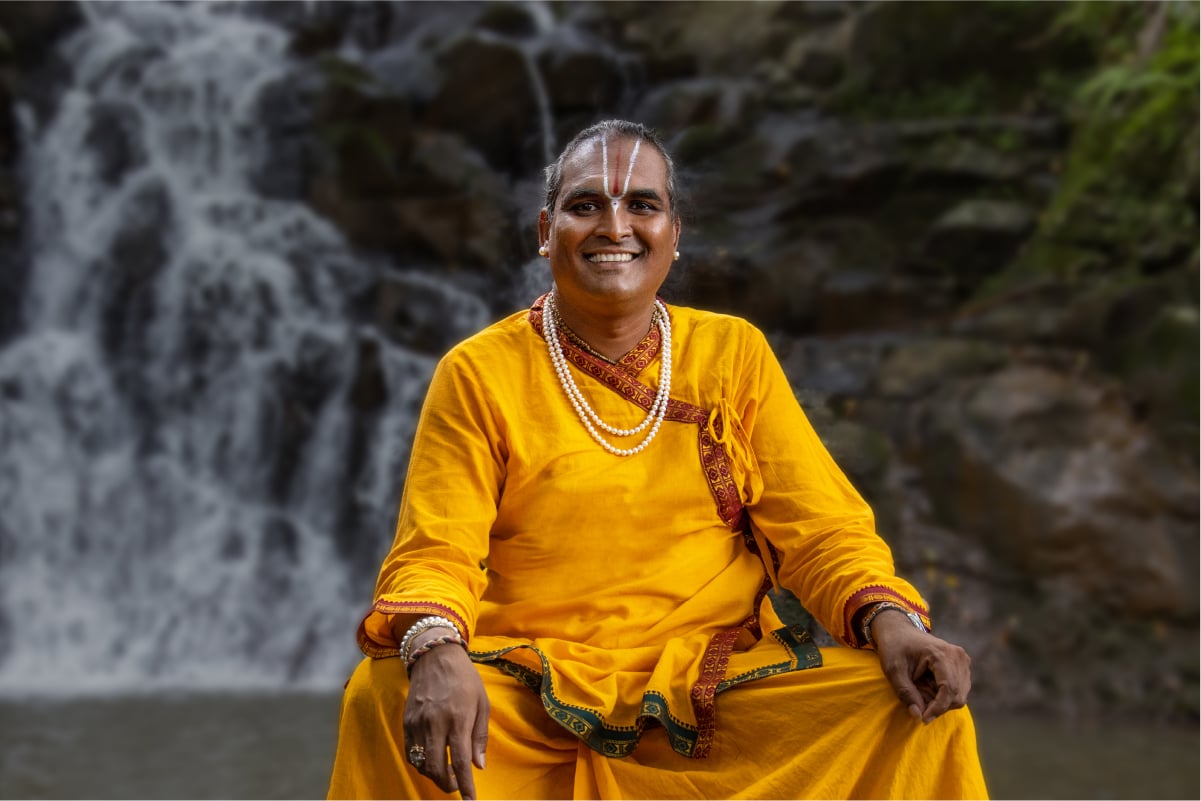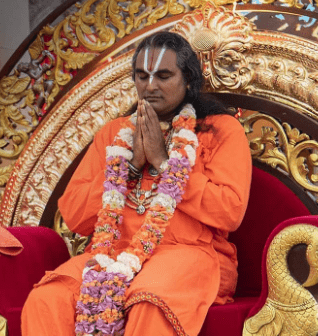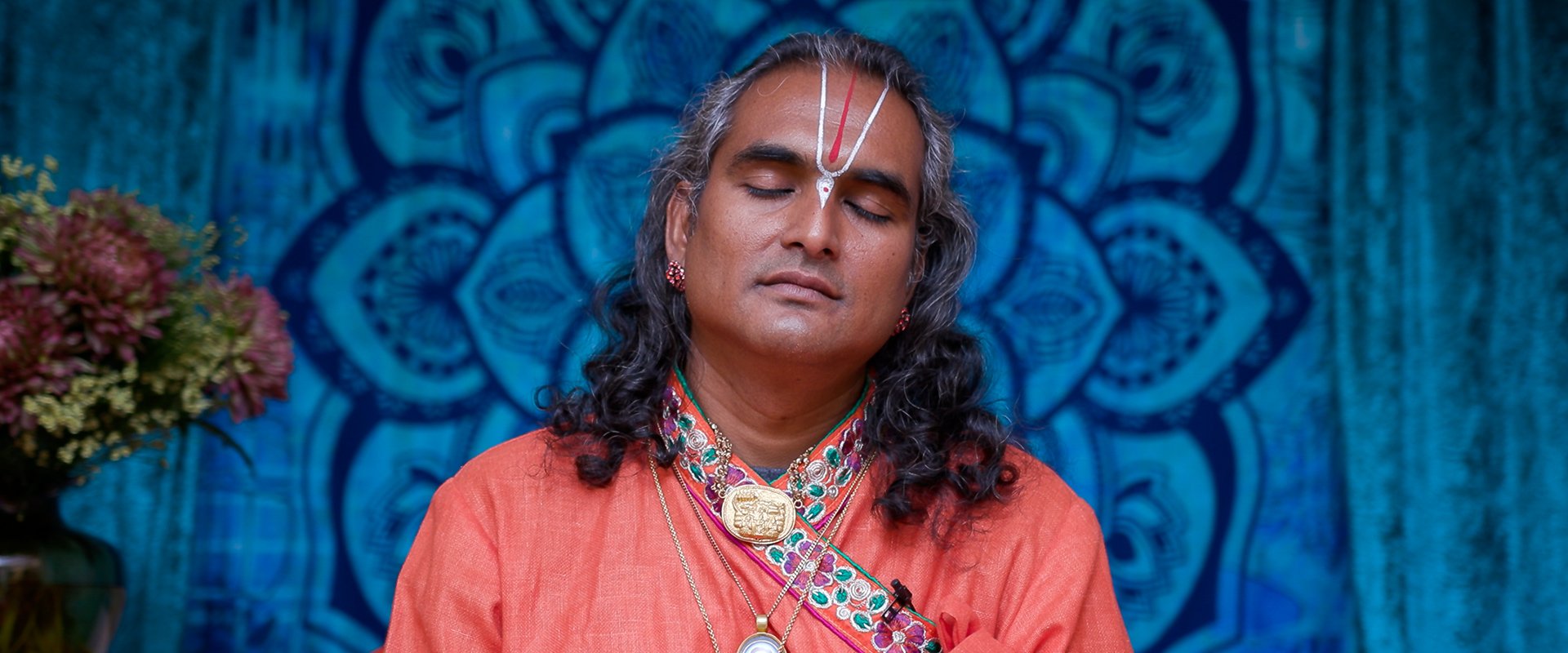What if I told you love is exactly the answer? It’s just that I mean love in a different way than you do. Love is such a fickle word. We use the same word to describe our liking for ice cream as we do to describe the affection we feel towards our parents or a sibling. We continue to use the same word to describe that feeling for our partners or our children. But when we direct that love towards the Divine and begin to see the Divine within and all around us, we arrive, invariably, to a love and purpose that fulfils us and provides an answer to all of our questions.
What is the purpose of life?
Hindu scripture teaches us that the purpose of life is to attain God. This, and this alone, is the very purpose of our existence. The bhakti tradition takes this a step further, maintaining that the purpose of life is to realise and awaken to the eternal, loving relationship with God. The atma, or the soul, incarnates on Earth and uses the material world and bodily existence to re-establish this relationship.
But the beautiful thing is that each relationship with God is inherently unique. If you put a thousand people in the same room and asked them, 'How do you experience God?' you would be certain to receive a thousand different answers. Each will have their own experiences of faith, love and trust. They will have their own way of knowing and relating to God. This diversity in the relationship is one of the most beautiful things about the spiritual path. It shows us that God's Love for us is not mass-produced and mechanical. Instead, the union between the lover and the Beloved is uniquely intimate with every soul.
But understanding intellectually and living it out are often two very different things. Just because our eternal purpose is the same (attaining God and living in a loving relationship with Him) does not mean our paths are the same. Every single person will walk a slightly different path to this, with different lessons to learn, different stepping stones on their path, and a different way of living.
If you learn to accept life how it is, whatever God has given you, you will see that life is such a beautiful adventure that every moment of your life is not boring. Every moment is an adventure that you are living, and it is a love adventure which always brings you closer to your goal. But you understand this only when you start to accept it, to embrace it.
- Paramahamsa Vishwananda
Take Valmiki for example. Valmiki lived sometime between 500 BCE and 100 BCE and was the author of the ancient text and scripture called The Ramayana. But before he was a sage (a Hindu term for a wise person) writing the story of Rama, he was a thief and a murderer named Ratnakar.
Paramahamsa Vishwananda tells this story often, including in Just Love Essentials.
One day, he was in the forest and saw a sage, by the name of Narada, coming. As Narada was passing by, Ratnakar jumped in front of him with a knife. Narada looked at him and said to him, ‘What do you want?’ He said, ‘I will kill you and will steal everything from you!’
Narada said, ‘Okay, kill me! I am not scared of you.’ Narada said, ‘I also have the most precious treasure of all. That’s the Name of the Lord Himself. You want to rob me? Rob me of that. I am actually here to give it freely to you.’ Narada’s reaction shocked him, because everybody else would tremble and Narada was not scared of him. Narada said, ‘Okay, but before you kill me I want to ask you one question: You are stealing, you are killing innocent people, for whom? For your wife and for your children, isn’t it?’
‘Yes, I am doing it for them.’
Then Narada said to him, ‘All the sins which you have accumulated throughout all these atrocities, all this killing you have been doing, will they also participate in that? Because if you are killing for them, for sure they will also participate in your sins.’ Then, he said, ‘Okay, go and ask them. I will wait for you here. I will not run away. Afterwards you can come and kill me, it’s fine.’
So, he ran quickly. He saw his wife first and said, ‘Wife, all these years, I have worked for you, I have cared for you, I have killed for you, so there is a question in me. I have accumulated so many sins in my life, would you participate in those sins?’ The wife said, ‘No. I am sorry, the sins are yours. You married me, you brought me here; I didn’t ask you. I am very happy that you are supporting me, but how you are doing it is your business, not mine. So, I can’t participate in your sins.’
Very disheartened, heartbroken, he went to his sons and said, ‘Sons, I have given you a wonderful life. You have got everything that you wanted; would you participate in my sins?’ The sons said, ‘No, we didn’t ask you to bring us here. You brought us into this world, so you have to look after us. This is your duty!’
So, Ratnakar was shocked and said, ‘I did everything for these people, these hypocrites, and now this is how they thank me?’ So, he sat down and started to reflect upon that: ‘All that I have done throughout my life was for these so-called ‘my people’, who are so dear to me, and today they can’t even participate in taking some of my sins upon them?’ Then he ran back to the forest where Narada was waiting for him.
He was shocked to see Narada there. If somebody says, ‘I will rob you, I will kill you’, and then that person goes away, and you say, ‘I will wait for you’, do you think you would sit there and wait for the person to come? It must be a very stupid person who does such a thing. So, he was shocked to see Narada there. The knife he had in his hand fell down, he bowed down at Narada’s feet and said, ‘No one wants to participate in my sins.’ Then, Ratnakar asked Narada, ‘What should I do?’
Narada said, ‘Hold upon the Feet of the Lord. He is the only true company. God is the only true relationship that we should have, because He is the one that will stand by us at all times. There is not a single time that God is not with you. You can’t say that God in good moments is with you and in bad moments He is not with you. God is with you at all moments of your life. Whether you perceive Him, whether you feel Him, whether you know that He is there or not, He is always there.’
Then, Narada gave him a mantra to chant, because he had to transform his mind, and the easiest way to transform the mind is to recite the Name of God. Because of his karma, of his sins, he could hear ‘Rama’, but he could not pronounce the Name of Rama. When he would open his mouth, ‘mara’ would come out. He tried and tried, but ‘Mara, mara’ would come out. Rama means eternal joy, that inner temple, but ‘mara’ means to kill, murderer. So, ‘killer, killer, killer’ is what would come out from his mouth. Due to that negative punya which he had accumulated, that is what he was receiving. He could not even pronounce the Name of Rama.
But by the grace of Sage Narada, who was there in disguise, he said to him, ‘Fine, you keep chanting “Mara, mara, mara.”’ So, if you chant ‘Mara, mara, mara, mara, mara, mara’ continuously, it becomes ‘Rama, rama, rama, rama’.
So, from ‘mara’, from ‘killing’, he attained the grace of the Lord. Then, he became the one who was destined to write the life of Sri Rama.
How great is this plan of the Lord, right? From a criminal, He became one of the most important saints in history. In whose hand does that lie? Was it lying in his hand or was it lying in the long term planning of Bhagavan’s hand? So, you see that even this is His plan, a plan to remind you of His Love for you, to remind you of your love for Him, to remind you of your relationship with Him. But for that to happen you must also make an effort.

Take your first step to know your purpose and meet a spiritual Master with Online Darshan.
How to Find Your Purpose
Fortunately, we have tools and teachings to help you figure out your path and your purpose. Just like Narada gave Ratnakar a mantra to free him, we can also use mantra meditations to calm our minds and find clarity.
Think of the mind like a sponge. It will absorb anything and everything you put into it, influencing your thoughts, belief systems, and behaviours. Following that logic, when you start to fill it with the Divine Names, your mind begins to transform and become Divine.
When you chant the Divine Names, it not only calms your mind but also opens your heart to Divine Love within yourself and in the world around you. As that happens, the calming mind becomes a side effect, a singular benefit of a much greater journey full of clarity of your purpose and path.
If each person has their own path, how do you know which one is yours? Your purpose or path can also be called your dharma. Dharma is an important concept in Hinduism and is steeped in the history and science of the faith. Studying dharma and applying its principles in life are significant aspects of living on a spiritual path. Everything is seen as having a purpose in the cosmic order and dharma is about correctly fulfilling that purpose. It is anything that you do that takes you closer to the goal of attaining God.
But maybe the best answer is to turn the question back on you. What are you doing?
That is your dharma. Whilst the concept of dharma can be very complex, this is the simplest way of interpreting it. The trick then is to accept it, to see it as part of your spiritual life, and a gift that God has given you. If we cannot accept the outside, what God has given to us, we will never be able to handle a greater duty when it arrives. That’s why He has placed each one in the world differently.
Through regular practice of self-analysis and introspection, you can generate clarity and stability, becoming an active participant in your own growth, change and development. In short, self-analysis begins with defining a goal and then becoming the observer, asking yourself what is helpful and what is not helpful to achieving your goal. But most importantly, self-analysis requires us to lose expectation and self-judgement. You can find a more detailed guide on how to perform self-analysis here.
_
How do you live your purpose?
It all comes down to aligning yourself with the will of God. He is the one who gives you passion and energy and the willingness to act in life. You can align with Him through spiritual practices and spiritual teachers. Paramahamsa Vishwananda often says that cultivating a spiritual lifestyle under the guidance of a proper teacher can give your life full meaning. You can put all your negativity away and live with direction and clarity. But this isn’t something you can do by yourself. You need help. We all need help. We need help fighting against the ego and pride and laziness and all our other negativity. That’s where the spiritual teacher comes in. A true guru or teacher can lead you down your path and can provide the necessary tools to find and live out your unique purpose and your eternal purpose.
Now while all this might sound well and good, it leaves a glaring question. How do you cultivate that relationship with the Divine so you can find and live out your purpose? While the teacher can give you the tools in the form of direct guidance and spiritual practices, you still have to act on them and turn them into part of your daily life.
The Veda, tradition, the conduct of virtuous people and one’s own conscience; this is declared to be the fourfold source of dharma, right before one’s eyes.
- Manusmriti 2.12
So we turn to the scripture for our answer. Outlined in the pantheon of Hindu scriptures are the twelve pillars of dharma.
The twelve pillars of dharma are:
- Purity - the cultivation of a pure and healthy body and hence a pure and healthy mind.
- Worship - to worship is to bow down before something greater than yourself, to commit yourself to a cause or a pursuit more important than your individual desires or gains.
- Austerity - the practice of remaining clear and firm in your path.
- Self-restraint - the cultivation of balance and controlling your desires and behaviours, avoiding excess and cultivating self-discipline.
- Study - the pillar of study carries multiple meanings. It refers to both self-studying, the act of self-introspection and analysis, and the study of Vedic literature.
- Contentment - the practice of acceptance and gratitude for what we already have
- Non-violence - the dedication to living your life with compassion and generosity, minimising any and all harm you could cause.
- Truth - this pillar has a threefold practice. It includes speaking the truth, developing discernment between objective and subjective truths, and seeking out the ultimate Truth.
- Generocity - the act of living in a manner that does not cause fear to any living being.
- Non-stealing - in essence, it is ´don’t take what is not yours.’ But if you go a little deeper into why non-stealing would be on the list of guiding principles for how to live your life, you’ll find that it includes a mindset of acceptance and non-jealousy.
- Forgiveness - forgiveness allows you to free yourself. By not forgiving someone who has harmed you, you are causing more harm to yourself than you are to them.
- Guru Veneration - the term guru includes parents, teachers, guides, elders and all those who teach something, no matter how small it may be. However, special worship is reserved for the spiritual Master who should be venerated on equal footing with God.
Regardless of your spiritual path or affiliation, conscious practice of the twelve pillars of dharma supports a life of compassion, kindness, introspection, and general personal development.
_
What should you do?
Now that we have a basic understanding of dharma and a conceptual understanding of practice, the question arises of how to turn all of that into daily practice. To start, I’ll offer three primary suggestions.
- Take shelter (guidance) from a Spiritual Master - in taking shelter and accepting the guidance of a spiritual Master, you can be certain that the decisions you make are based on His teachings and are in accordance with dharma. You will be guided in both your worldly purpose and your eternal one. You can take shelter by formally accepting one as your satguru through devotee initiation, following His teachings as closely as possible, and receiving darshan. In practice, this doesn’t have to involve changing one’s life or lifestyle; it can merely mean having access to someone who can give you the best advice specifically for you to live your life to its fullest!
- Sadhana - a set of prescribed spiritual practices and forms of worship that help you cultivate and attune to your individual relationship with God. One of the simplest and yet most powerful places to start is by chanting japa (chanting Divine Names) daily.
- Study - this can be understood in two ways. First, as a scriptural study as a method of coming to know about the Lord and proper action. Secondly, as a self-study or introspection on one’s action and meditation into your true identity. Regular practice of both scriptural study and self-analysis will help clear any confusion you might have and bring you closer to understanding your purpose.
The eternal purpose of each individual is to return to a state of complete, loving devotion to God. Nonetheless, each individual has their own duty and path to achieve that. Acceptance and cultivation of devotion are the keys to achieving the eternal goal while living our individual purpose and duty. Hindu scriptures teach us that it’s not about what we’re doing outside that defines our purpose. It is about how we interact with the role and duties we’ve been given in life internally.









